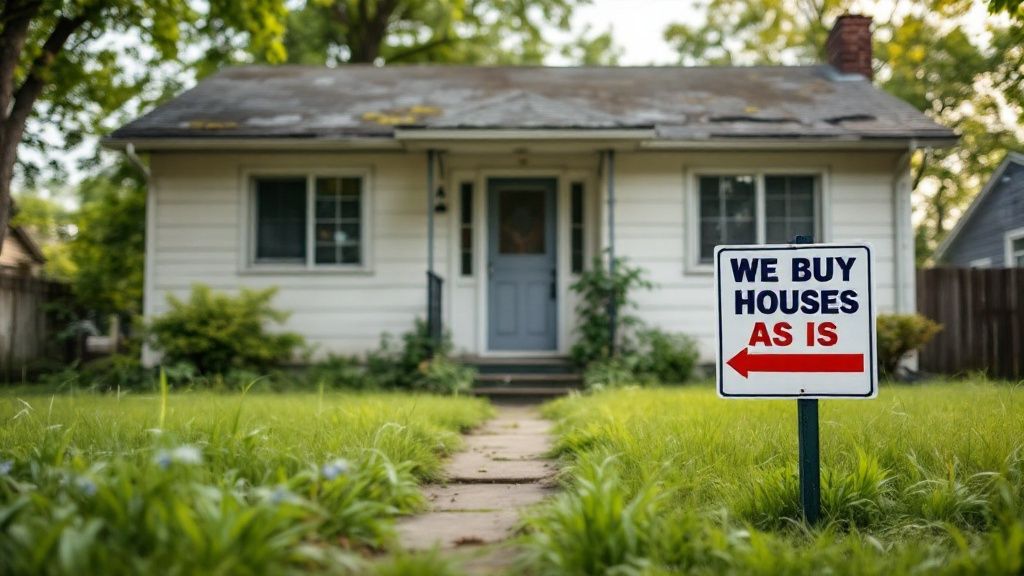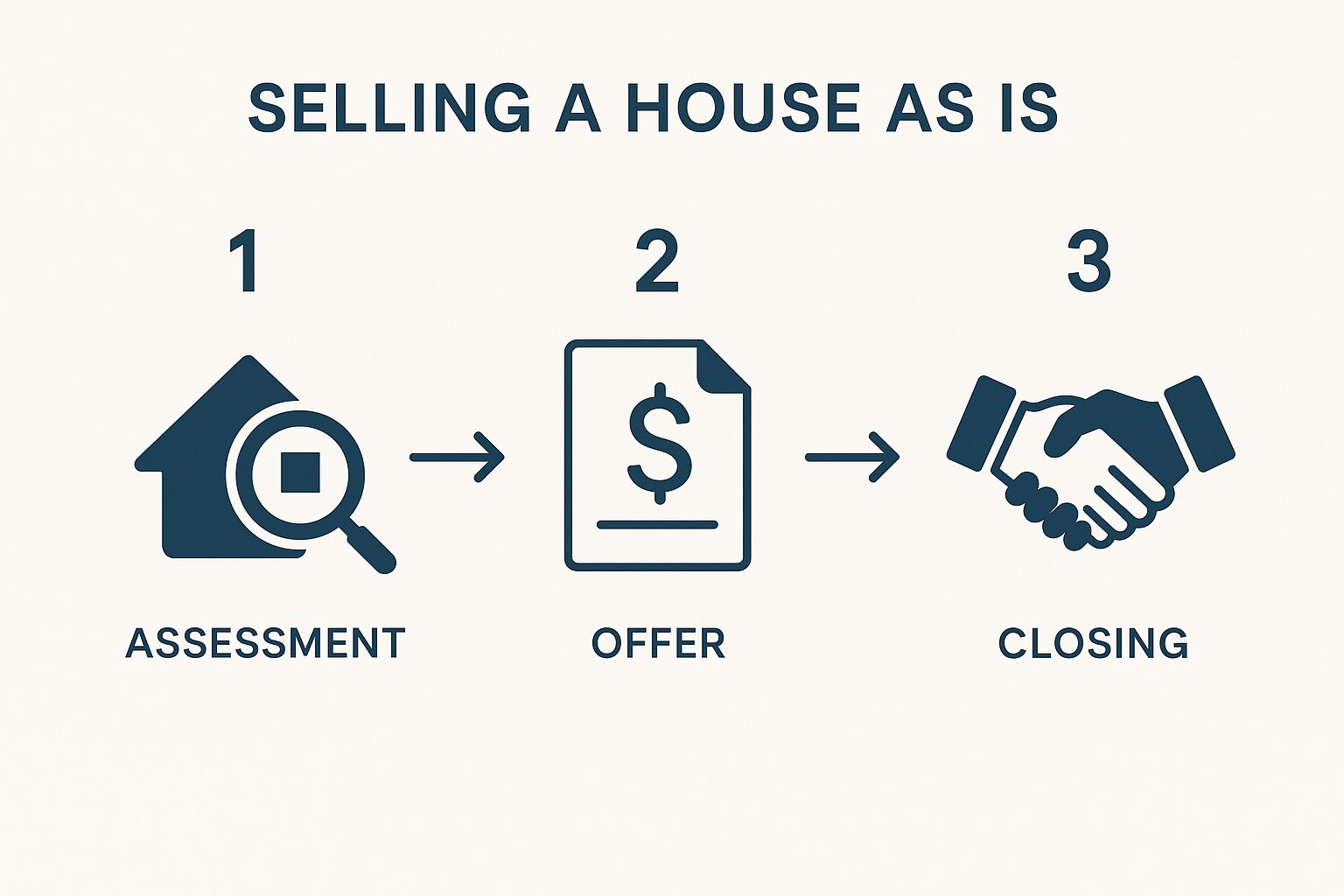Selling a house ‘as is’ means you are selling the property in its current state, without making any repairs or improvements for the buyer. The solution works best for people who want to sell their home quickly without dealing with market preparation costs or traditional listing processes.
Your Guide to Selling a House As Is

The decision to sell a home at its current market value stands as an essential choice for every homeowner. The situation emerges from actual events when you inherit property you cannot handle or face financial challenges or lack the resources to perform major home improvements. The method functions because it maintains a straightforward structure.
The pre-sale process becomes unnecessary when you choose this option. No more spending weekends debating paint swatches, getting quotes from contractors, or staging every room to perfection for an open house. The property stands in its present condition with all existing defects exposed to potential buyers.
Understanding Your Options
The “as is” path leads you to three main options. The three options provide various combinations of speed and convenience and financial return. Your best choice depends entirely on your personal goals.
- You can work with a realtor who has experience in handling “as is” or distressed properties through the listing process. Your agent will promote your home through their network which includes investors and buyers who search for properties to renovate. You need to choose between getting more money through a real estate agent but it will take longer to sell and you will need to pay their commission.
- For Sale By Owner (FSBO): Going it alone gives you total control. Your responsibilities include pricing and marketing and all negotiation processes. The biggest advantage is the ability to save agent fees yet this method requires the most time and expertise.
- Selling to a Cash Buyer: This is the most direct path. Eagle Quick For Cash and other cash home buyers will assess your property to provide a no-obligation offer which they can complete within a few weeks. The fastest option with the least amount of work on your part.
The following summary will assist you in understanding the different alternatives.
Comparing Your ‘As Is’ Selling Options
The table presents a direct comparison of three main ‘as is’ home selling methods to help you determine which approach meets your requirements for speed and price and personal involvement.
| Selling Method | Typical Closing Time | Sale Price Potential | Seller Effort |
|---|---|---|---|
| Cash Home Buyer | 7-14 days | Lower, but firm & fast | Minimal |
| Real Estate Agent | 30-90+ days | Potentially higher | Moderate |
| For Sale By Owner | Varies widely | Highest possible (if done well) | High |
The proper method depends on which aspect you consider most essential between maximum price and quick sale with minimal effort.
An “as is” sale provides sellers with an opportunity to obtain quick results but requires them to accept lower than market value for their property. The program provides an efficient solution for sellers who want to move on from their property quickly without trying to get the highest possible price.
Your sales plan should include a complete financial plan. The initial step requires you to investigate methods which assist in reducing Capital Gains Tax for property sales to understand upcoming tax liabilities. We will analyze these selling approaches to discover which one suits your requirements.
Why Homeowners Choose the As Is Path

The decision to sell a house “as is” usually isn’t about taking the easy way out. The decision emerges from essential requirements in most cases. The world throws unexpected challenges at us which makes traditional home selling processes with repairs and showings impossible for many individuals. Homeowners turn to companies that purchase properties in their existing state because of these actual circumstances.
The process of managing an inherited house from a distant family member requires you to evaluate. The property needs both a new roof and kitchen renovation and managing contractors from a different state becomes extremely difficult. The majority of people in this situation must sell their property to cash buyers because this method provides the quickest way to finish the estate process and move forward.
Financial distress is another huge factor. When you’re staring down the possibility of foreclosure, the stress can be overwhelming. The quick cash sale provides an immediate solution which delivers instant cash to settle your mortgage debt and defend your credit standing while you start fresh without enduring prolonged market uncertainty.
Common Reasons for an As Is Sale
The reasons behind an “as is” sale differ between homeowners yet certain situations appear frequently which make this approach sensible.
- Sudden Job Relocation: You got a great job offer, but it’s across the country and starts in three weeks. The house needs to be prepared for market but there is no time left.
- Tired Landlords: After years of chasing rent, fixing leaky faucets, and dealing with difficult tenants, you’re just done. The ultimate goal exists to speed up the property sale process.
- Health and Mobility Issues: For older homeowners or those with health challenges, the physical work of maintaining a home—let alone preparing it for sale—can become impossible.
What do all these situations have in common? The solution needs to function without any delays or problems. The traditional market fails to provide this kind of security because it operates through unpredictable timeframes and deals that frequently collapse at the last moment.
The stress of selling your home during a major life change needs to be avoided at all costs. The process of selling “as is” enables homeowners to reclaim their time and restore their sense of peace in life.
The market inventory of homes continues to expand while sellers face more competition from other sellers who have entered the market. During the sales process you will obtain a guaranteed cash offer which avoids all financing problems that usually disrupt traditional home sales. The U.S. housing market outlook from JPMorgan shows that increasing inventory levels force conventional sellers to enhance their marketing efforts.
You need to understand the financial trade-offs. You need to understand the amount you could lose when selling your house as is to make an informed decision. The cash buyer option works well for people who need to sell their property quickly because it provides fast and predictable results.
Exploring Your Three Main Selling Options

You have made the decision to sell your house at its current value. What now? You have three different choices to make and each option requires different amounts of effort and provides various results in terms of speed and cost. The first step to finding the right solution for your finances and lifestyle requires understanding the advantages and disadvantages.
Your three main choices are selling directly to a cash buyer, listing with a real estate agent, or going it alone with a For Sale By Owner (FSBO). The perfect answer does not exist because what works for one individual may not work for another person. Your decision depends on what you need to achieve from the sale.
Let’s break them down.
Option 1: Selling to a Cash Buyer
The method stands as the quickest and most direct approach. Real estate investors who use their own funds conduct purchases through companies that promote “we buy houses as is” services. The process moves fast because they don’t need bank approval for their mortgage.
The biggest draws here are speed and pure convenience.
- The process allows you to receive cash within 7 to 21 days. No Repairs, Period: They buy the house exactly as it stands. You don’t lift a hammer or a paintbrush.
- Zero Commissions: You won’t be paying agent commissions or, in many cases, any closing costs.
The trade-off for all this convenience is the offer price. A cash buyer must include the expenses for property repairs and maintenance costs and their target profit percentage. The offer price will be lower than what you could receive from the open market. But if your number one goal is a guaranteed, fast, and painless sale, this is an incredible option.
The main advantage of selling to a cash buyer becomes the guaranteed sale. The process provides you with an instant offer and a set closing date which protects you from market fluctuations and buyer financing problems.
Option 2: Listing with a Real Estate Agent
You must team up with a real estate agent who specializes in selling as-is properties when you want to proceed. A skilled agent who understands this market segment will set the right price point for your home to attract buyers who are investors or homeowners who want to handle their next renovation project.
Your home reaches more potential buyers through the market which enables you to obtain a superior price than the immediate cash offer. The process requires you to deal with certain difficulties. The complete process requires a minimum of 30 days to 90 days or more between the time you list your property and when it actually sells. Plus, you’ll be on the hook for agent commissions, which typically eat up 5-6% of your final sale price.
Option 3: For Sale By Owner (FSBO)
The FSBO approach gives you complete control over every aspect of the selling process. You are responsible for establishing the price and promoting the property and arranging showings and handling all negotiations with potential buyers. The biggest carrot here is saving a boatload of money on agent commissions.
The path requires you to dedicate the most time and effort while needing advanced knowledge. You have to handle all legal documentation and marketing activities and major negotiation processes. The entire process becomes dangerous and complicated when people who lack real estate experience start handling property transactions.
Figuring out which option is best for you really boils down to weighing your need for speed against your desire for top dollar. The guide provides additional information about direct sales which appear to be the right selection for you. A cash buyer provides homeowners with a straightforward method to avoid complex home selling procedures.
How Cash Buyers Calculate Their Offers
The process through which a “we buy houses as is” company determines a specific value for your property remains unclear to most people. The price results from a deliberate process that goes past random number generation. The method contains a defined business approach which protects against risks while generating revenue.
Think of it this way: cash buyers aren’t looking for a forever home. The buyers function as investors in this transaction. Their approach is grounded in the principles of flipping items for profit, where the property is a project with a specific financial goal.
It All Starts with the After Repair Value
The entire offer calculation hinges on one critical number: the After Repair Value (ARV). This is simply an estimate of what your house could sell for on the open market if it were completely fixed up and modernized to today’s standards.
The ARV calculation requires investors to examine recent sales of comparable updated properties within the same neighborhood. The number establishes the maximum limit of what they could receive after completing all the work. From there, they start subtracting their costs.
Breaking Down the Math
With the ARV locked in, the buyer begins deducting all the anticipated expenses. The process leads to the determination of your cash offer.
- Repair Costs: This is the biggest piece of the puzzle. An investor will walk through the property and create a detailed budget for everything needed to hit that ARV. The list includes major construction projects like roof replacement and complete kitchen renovation as well as minor improvements such as painting and fixture and flooring installations.
- Holding Costs: Time is money. The investor must pay property taxes and insurance premiums and utilities costs including water and electric and any homeowner association fees for every day they own the property before selling it again. The expenses accumulate at a rapid pace.
- Selling Costs: Once the renovation is complete, they still have to sell the house. The final stage of the home selling process requires sellers to pay realtor fees and title costs and other closing expenses which typically reduce their total sale proceeds by 6 to 10 percent.
- Profit Margin: At the end of the day, this is a business. The investor needs to build in a profit margin to compensate for the risk, time, and capital they’ve put on the line.
The formula is pretty straightforward: ARV – Repair Costs – Holding Costs – Selling Costs – Profit Margin = Your Cash Offer. The transparent method produces offers that appear low at first but include all the buyer’s expenses and risks.
The three-step procedure enables homeowners to complete an ‘as is’ cash sale which many people find appealing.

The entire process moves at a fast pace from initial assessment to final offer and quick closing which eliminates the usual delays of traditional home sales.
This model is becoming more and more common. A fair cash offer typically provides 70% of the home’s ARV which enables a fast and easy sale. The cash buyer option works well for people who need to sell their property quickly because it provides fast and predictable results.
You should know all your available choices because your property requires extensive repairs. Our guide on selling homes that need repairs will show you different methods to sell your property. The team at Eagle Quick For Cash provides fast cash offers to help you select the best solution for your particular situation.
If you’d like to dive deeper into the mechanics of a quick sale, take a look at our guide on how to sell my house fast for cash.
Navigating the As Is Sales Process
Once you’ve decided to sell your house as is, you need a clear path forward. It’s not an overly complicated journey, but knowing what to do—and when—makes all the difference in getting to the closing table without any hiccups.
Before you do anything else, get your paperwork in order. I always tell homeowners to pull together the property deed, their latest tax statement, and any mortgage payoff information. Having these documents ready from the start makes everything move faster, whether you’re working with an investor or a traditional agent.
What You Still Have to Disclose
A lot of people think “as is” is a free pass to say nothing about the property’s problems. That’s a dangerous myth. The reality is that most states legally require you to disclose any known material defects. These are the big-ticket issues that could seriously impact the home’s value or a buyer’s safety.
You don’t have to fix them, but you absolutely have to be upfront about them. We’re talking about things like:
- A basement that you know has flooded before.
- Cracks or settling in the foundation.
- A roof that leaks every time it rains.
- Any known problems with the electrical or plumbing systems.
Trying to hide these issues is a recipe for a lawsuit down the road. Being transparent protects you and builds trust with the buyer.
Reviewing Offers and Signing the Deal
When you start getting offers, you’ll see a big difference between a cash buyer and a traditional one. A purchase agreement from a cash home buyer is usually refreshingly simple. It’s cleaner, with far fewer contingencies. They’ll likely do a quick walkthrough to confirm the condition, but they aren’t going to nitpick or ask for repairs. This is why you can close so quickly—often in just 7–14 days—since there’s no bank slowing things down.
Now, compare that to a traditional offer. Even if they agree to buy “as is,” there will almost certainly be an inspection contingency. This clause gives them an out. If their inspector uncovers more issues than they bargained for, they can walk away from the deal, and you’re right back at the beginning.
The biggest advantage of a cash sale is certainty. When a company that says “we buy houses as is” makes an offer, it’s typically a firm commitment, free from the financing and appraisal hurdles that can derail a traditional sale.
The market has really highlighted the value of this approach. According to the National Association of REALTORS®’ latest report, the share of first-time homebuyers has fallen to just 24%, the lowest it’s been since 1981. With fewer buyers willing to take on a fixer-upper, the speed and reliability of a cash sale becomes a much more practical choice.
If your property needs a lot of work, it’s smart to know all your options. You can dive deeper into different strategies by checking out our guide on selling a house that needs repairs. At Eagle Quick For Cash, we provide a straightforward cash offer, but our goal is to give you the clarity you need to pick the best route for your specific situation.
Common Questions About Selling As Is
The first-time process of selling a house through an “as is” sale brings many questions to the surface. Getting straight answers is the best way to feel good about the path you choose, whether that’s a traditional sale or a quicker cash offer.
The following section will help us identify typical concerns that home sellers face when they decide to sell their property without investing additional time or money.
Does “As Is” Mean I Can Hide Problems With My House?
This is a big one, and the answer is a hard no. It’s probably the single biggest misunderstanding about “as is” sales. The term simply means you, the seller, won’t be making any repairs before closing. It’s not a free pass to hide known issues.
In fact, most states have laws that legally require you to disclose any known material defects. We’re talking about the big stuff—a leaky roof, cracks in the foundation, a history of basement flooding, you name it. Trying to conceal these things can land you in serious legal hot water down the road. Being upfront is your best protection.
Will I Get a Lowball Offer From a Cash Buyer?
Your offer will definitely be less than what the home might fetch on the open market after a full renovation. Companies that run on a “we buy houses as is” model are businesses, after all. Their offer has to make sense for them, too.
Here’s how they think: they calculate the home’s potential value after they’ve fixed it up (the After Repair Value, or ARV). Then, they subtract all the anticipated costs for repairs, holding expenses (like taxes and insurance), and their own profit margin.
So, it’s not really a “lowball” offer. It’s a number that reflects the convenience you’re getting. You’re trading some of that top-dollar potential for speed, certainty, and freedom from repairs, showings, and commissions.
The real value in a cash offer isn’t just the number on the page. It’s the guarantee of a fast, clean closing. For many sellers, skipping months of stress and uncertainty is worth more than holding out for the highest possible price.
Can a Buyer Still Inspect an “As Is” Property?
Yes, and you should expect them to. A sale conducted through “as is” terms does not require buyers to perform blind inspections.
For a cash buyer, the inspection is mostly about confirming their initial estimates. The buyer must verify that no surprise discoveries exist within the walls which would result in a complete budgetary disaster for their renovation project.
The inspection proves vital for buyers who use conventional market transactions. The buyer might change their mind about repairs even though they have agreed to forgo them. The buyer can use the inspection contingency to back out of the deal without losing their deposit if they find major undisclosed issues.
Every seller’s situation is unique. The choice you make will depend on what matters most to you between maximizing your sale price and achieving a quick uncomplicated sale. The team at Eagle Cash Buyers can provide you with a fair offer without any obligation if you believe a direct cash sale is the best option. You can learn more about our process at https://www.eaglecashbuyers.com.





